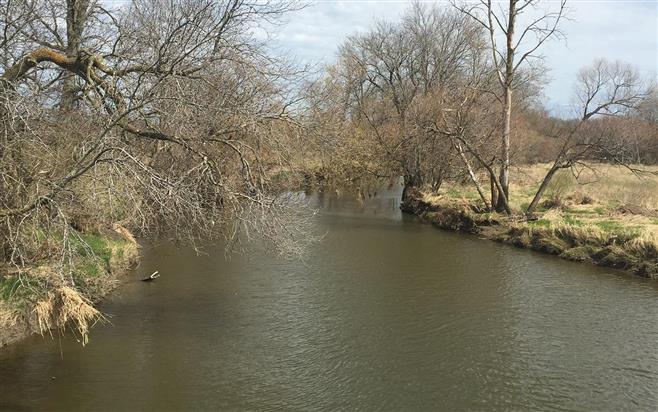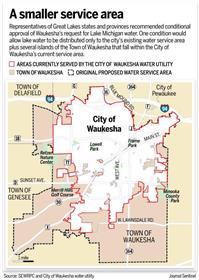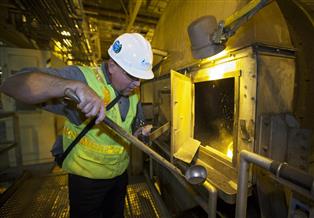Great Lakes group backs Waukesha lake water diversion

The City of Waukesha would receive Lake Michigan water, and turn off its deep wells drawing radium-contaminated water from a sandstone aquifer, under a recommendation approved Wednesday by representatives of Great Lakes states and provinces.
The group on a 9-0 vote affirmed that the city's application for a Lake Michigan water supply would comply with terms of a Great Lakes protection compact if numerous conditions the representatives recommended were imposed on the plan.
Minnesota representative Julie Ekman abstained from voting. She did not vote because the state's top officials were continuing to review the regional group's conditional declaration of support and it was not an indication of opposition to the city's request, Ekman said.
Representatives of the eight states and two provinces voted on the declaration during a Wednesday morning conference call.
Two of the conditions recommended by the group include a lower volume of lake water and a smaller distribution area than requested by Waukesha.
Governors of the eight states, or their designated representatives, will meet in Chicago in late June to consider the regional group's conditional approval and vote on the city's request.
The Conference of Great Lakes and St. Lawrence Governors and Premiers had not confirmed a meeting date as of Wednesday morning.
The Great Lakes compact requires a unanimous vote of approval by the eight states. The premiers of Ontario and Quebec do not vote at that time, though their representatives on the regional group recommended approval of the request with conditions.
Although the compact requires review of a water diversion request by representatives of the eight states and two provinces, the regional group's recommendation of support does not guarantee final approval by the states.
If Waukesha's request is granted, however, the city would become the first U.S. community located entirely outside the Great Lakes drainage basin to receive a diversion of lake water since the compact became federal law in 2008.
In December 2015, the Wisconsin Department of Natural Resources concluded a five-year review of the city's request with a finding that the continued pumping of water from the deep sandstone aquifer was not sustainable since it is 350 feet below predevelopment levels.
The DNR said the city does not have an adequate supply of water fit to drink, because of radium contamination of deep groundwater supplies, and that all the city's options outside the Great Lakes basin — including drilling additional wells — would have adverse effects on wetlands, streams and inland lakes.
"This all started with the city's proposal to address a public health problem," Eric Ebersberger, deputy administrator of environmental management for the DNR, said at the conclusion of the regional group's vote.
Waukesha residents "need the healthy and sustainable water supply that only borrowing and returning Lake Michigan water can reasonably provide," Waukesha Mayor Shawn Reilly said in a statement.
The city's $207 million plan includes building pipelines and pumping stations to carry lake water over the subcontinental divide and return the water as treated wastewater to the lake. Waukesha is planning to buy lake water from Oak Creek, pump it to Waukesha for distribution, and to discharge treated wastewater to the Root River, a tributary of the lake.
Apart from that general description of the project, the states will be taking action next month on a request significantly altered with conditions recommended by the regional group.
In their declaration of finding the request met compact requirements for a diversion of water out of the basin, the regional group recommended that portions of four communities be removed from Waukesha's original future water service area proposal as a condition of approval.
They approved a much smaller area that could be served with lake water. It would include only the city's existing service area, plus several town islands — small pieces of the town completely surrounded by the city.
One other condition would set a daily average of 8.2 million gallons of lake water as the maximum volume that could be piped to Waukesha for the smaller service area by midcentury.
In a revised application submitted in 2013, the city requested up to an average of 10.1 million gallons a day of lake water by midcentury to serve the larger area.
Another of the conditions recommended by the regional group would require Waukesha to monitor water quality in the Root River for a minimum of 10 years.
Clean Wisconsin, Midwest Environmental Advocates and a few other state environmental groups said in a joint statement that the city's diversion proposal should have been rejected by the regional representatives rather than modified with conditions.
"We need to carefully examine the conditions that the regional body has recommended to determine if they uphold the letter and spirit of the Great Lakes compact." the groups said.
Cheryl Nenn, a riverkeeper for the Milwaukee Riverkeeper environmental group, criticized the regional officials for not carefully considering impacts of Waukesha wastewater discharges on the Root River and the downstream City of Racine.













